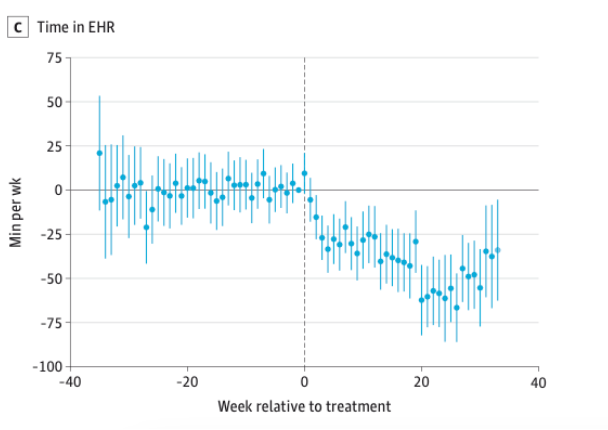research
Study: Can team-based notes slash EHR time?

A new large-scale study assessing team-based documentation strategies — like using medical scribes or co-authored notes — concludes that they increase clinicians' productivity and reduce time spent filling out electronic health records. It's an early attempt to quantify the impact new documentation approaches have on doctors, authors said in their JAMA Internal Medicine investigation.
The analysis covered more than 18,000 ambulatory doctors and their notes taken between September 2020 and April 2021. It revealed that team-based documentation was linked to a 6% increase in visits and a 4.1% decrease in EHR time. But doctors with less than 40% of notes co-authored by another team member didn't see any time saved, researchers wrote.
Artificial intelligence
A national AI registry could help increase transparency, experts say
Also on hospital IT, a group of AI experts is pushing for a national registry of AI tools that would lay out where and how products are being used, as well as how well they work, my colleague Casey Ross reports. It's meant to fill a potentially dangerous gap in AI monitoring, which is mostly conducted at individual health systems.
"Everybody is doing this differently, and many health systems are not doing it," Michael Pencina, chief data scientist at Duke Health, told Casey.
It's not an entirely new idea: There are already databases logging clinical algorithms and equations, for instance, and the White House pitched a similar idea in its AI blueprint last year.
But a crucial question is whether AI vendors will be on board. Many leading AI vendors and distributors, including Epic, Oracle Health and Microsoft, declined to comment or didn't respond to Casey's request for interviews on the topic.
"If I'm a developer of an algorithm that drifts and doesn't do well, I probably would not want to advertise it publicly," Pencina said. "I'd like to have that information first and try to fix it." Read more, and let me know if you think the idea has legs.
startups
MedArrive pivots away from in-home medical care
A health tech startup co-founded by former Lyft and Uber exec Dan Trigub is turning away from its original mission of home health care in search of a more viable and sustainable business, leaders told me earlier this week. Founded in 2018, MedArrive was initially focused on dispatching EMS professionals and other "physician-extenders" to patients' homes, where they'd connect to doctors via telehealth to treat patients who couldn't make it to in-person care. (The company used to partner with health plans and managed care groups like Centene.)
Now the company's wound down that practice and is focusing on building IT health care providers can use to make their own workforce more efficient, including scheduling and care coordination, Trigub and Tharika Chandrasekhar, who oversees operations and tech product management at MedArrive, told me. While MedArrive's longitudinal home care programs helped Medicaid patients stay out of the emergency department (among other metrics), "the economics were very very difficult," Trigub said.
But leaders realized the company, which has raised $40 million in venture funding, had built some potentially valuable technology along the away that other providers could use, he explained. "We really saw a unique opportunity to really move away from just a service business."
For now, MedArrive is partnering with a set of health care providers to co-develop and refine the technology, and the goal is to commercialize it in the next year or so. "We definitely want to make sure we're proving value before we start charging for it," Chandrasekhar said.
whole body scans
Prenuvo tests out a mobile clinic in Buffalo, N.Y.
The Bay Area startup known for popularizing full-body scans — including among celebrities like Kim Kardashian — is trying a new tactic to reach patients for preventive imaging: Send a semi-truck outfitted with a body scanner around the country, beginning with Buffalo. Prenuvo, which was originally founded in Vancouver but now operates largely in the U.S., is also exploring the possibility of expanding into various Canadian provinces, but each one has its own regulations surrounding preventive services, founder Andrew Lacy told me. Located initially at the border of the U.S. and Canada, a mobile clinic could draw patients from up north, he said.
It's also an attempt to test-drive the viability of a mobile clinic that could eventually be dispatched across the country for a few months at a time, he said. "We wanted to make sure we understood, operationally, how to run this type of machine," he said. "There are markets where there isn't quite yet enough local demand to justify what would otherwise be quite an expensive [permanent] clinic."
Prenuvo's biggest challenge, he said, is that "the level of awareness of preventive screening is still very low everywhere — it's low among consumers, it's low among physicians, it's low among the types of people that are decision-makers among provincial governments," he said.
Still, as STAT has reported, imaging experts and doctors disagree on the clinical value and potential downsides of elective preventive screening, especially those that aren't covered by insurance and can cost thousands of dollars out of pocket.
virtual care
Major drugmakers turn to telehealth for migraine care
This week my colleague Katie Palmer dives into the pharma world where she's seen growing interest in virtual care: Major drugmakers like Amgen, AbbVie and Eli Lilly are all promoting telehealth alongside their migraine drugs, for instance. And Pfizer climbed on the bandwagon today when it launched its own direct-to-consumer portal PfizerForAll, where it offers, among other services, an option to "talk to a doctor now" and get prescriptions filled through an online pharmacy. Read more on what it all means from Katie.


No comments